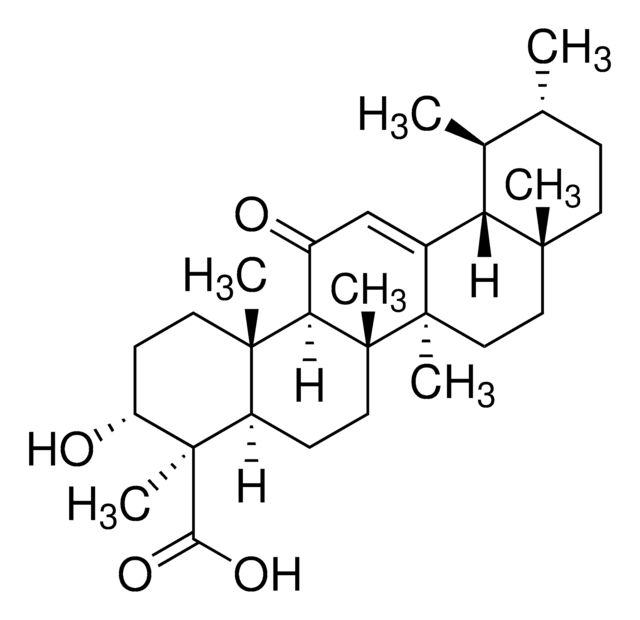A9855
3-Acetyl-11-keto-BETA-boswellic acid
from Boswellia serrata
Sinónimos:
AKBA
About This Item
Productos recomendados
biological source
Boswellia serrata
Quality Level
form
powder
application(s)
metabolomics
vitamins, nutraceuticals, and natural products
storage temp.
−20°C
SMILES string
O([C@H]1[C@]([C@H]2[C@@]([C@@H]3[C@]([C@@]4(CC[C@@]5([C@@H]([C@H]([C@@H](CC5)C)C)C4=CC3=O)C)C)(CC2)C)(CC1)C)(C)C(=O)O)C(=O)C
InChI
1S/C32H48O5/c1-18-9-12-28(4)15-16-30(6)21(25(28)19(18)2)17-22(34)26-29(5)13-11-24(37-20(3)33)32(8,27(35)36)23(29)10-14-31(26,30)7/h17-19,23-26H,9-16H2,1-8H3,(H,35,36)/t18-,19+,23-,24-,25+,26-,28-,29+,30-,31-,32-/m1/s1
Inchi Key
HMMGKOVEOFBCAU-BCDBGHSCSA-N
General description
Application
- to test its effects as an anti-proliferating agent on hepatic stellate cells (HSCs) proliferation and synergism in combination with imatinib in in vitro models
- to study its anti-osteoporotic activity on ovariectomy-induced osteoporosis in female Sprague Dawley rats
- in a comparative study with aspirin to test its effects as an anti-inflammatory drug to prevent intestinal adenomatous polyposis in APCMin/+ mice
Biochem/physiol Actions
Storage Class
11 - Combustible Solids
wgk_germany
WGK 3
flash_point_f
Not applicable
flash_point_c
Not applicable
Elija entre una de las versiones más recientes:
Certificados de análisis (COA)
¿No ve la versión correcta?
Si necesita una versión concreta, puede buscar un certificado específico por el número de lote.
¿Ya tiene este producto?
Encuentre la documentación para los productos que ha comprado recientemente en la Biblioteca de documentos.
Los clientes también vieron
Nuestro equipo de científicos tiene experiencia en todas las áreas de investigación: Ciencias de la vida, Ciencia de los materiales, Síntesis química, Cromatografía, Analítica y muchas otras.
Póngase en contacto con el Servicio técnico









